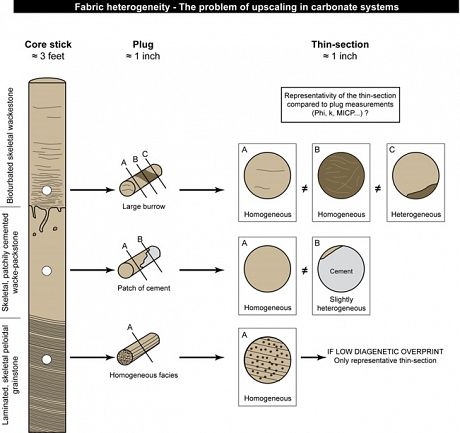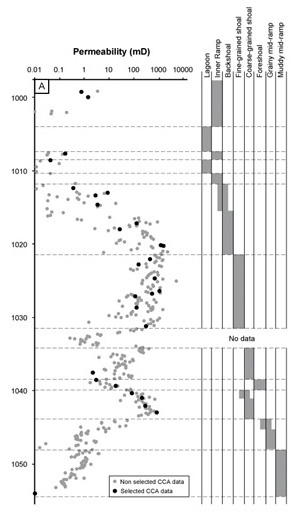
Course objectives and content
A comprehensive 5 day course introducing the attendees to the world of carbonate rocks from the large-scale sedimentological and sequence stratigraphic evaluation to the microscale thin-section observations. A full immersion into facies analysis, diagenetic processes and pore evolution aims towards the understanding and prediction of vertical and lateral variability in reservoir properties.
The first part of this course is designed to develop skills in characterising carbonate rocks and identifying their depositional settings. This includes an insight into the controls on the formation of the carbonate factory and hence the predictability of the geometry of carbonate reservoirs in the subsurface. Sequence stratigraphic methodologies and applications will also provide the tools needed to reconstruct the sedimentological architecture at the field scale. The second session will focus on the diagenetic processes and products that have an impact on carbonate reservoirs, while reviewing the various analytical techniques utilised in identifying the origin of the diagenetic phases and therefore predict their potential vertical and lateral extent. Finally, the pore system evolution is analysed, integrating the intricate link between diagenesis and sedimentology to aid prediction of reservoir properties at the field scale. Each section of the course will be accompanied by example case histories and practical exercises.
Who Should Attend?
The course is targeted at all geoscientists, including petroleum geologists, petrophysicists and petroleum engineers involved in exploration and production of carbonate plays. Although there are no prerequisites for this course, a basic understanding of sedimentology may be advantageous.
The course is targeted at all geoscientists, including petroleum geologists, petrophysicists and petroleum engineers involved in exploration and production of carbonate plays. Although there are no prerequisites for this course, a basic understanding of sedimentology may be advantageous.
Instructors
Badley Ashton's carbonate reservoir geologists have a keen interest in sedimentology and petrography with established experience in the Middle East. Our geologists currently work on single-well and multiwell reservoir quality evaluation studies dealing with carbonate plays in the Arab Gulf. These projects cover a wide range of depositional environments from shallow to deeper water carbonates. The instructors have a combination of industrial, research and teaching experience.
Badley Ashton's carbonate reservoir geologists have a keen interest in sedimentology and petrography with established experience in the Middle East. Our geologists currently work on single-well and multiwell reservoir quality evaluation studies dealing with carbonate plays in the Arab Gulf. These projects cover a wide range of depositional environments from shallow to deeper water carbonates. The instructors have a combination of industrial, research and teaching experience.

Session outline
The course is organised into three sessions, with a variety of modules in each session:
Session 1: Sedimentology and sequence stratigraphy
Part A: The carbonate system - "Carbonates are born not made"
• Mineralogy, composition and classification of carbonate rocks
• The carbonate factory and controls on carbonate production
• Applied carbonate facies analysis with core-based and thin-section examples
• The key to identifying carbonate depositional environments
Part B: Sequence stratigraphy applied to carbonate reservoirs
• Introduction to the basic concepts of sequence stratigraphy
• The carbonate record and sea level variations
• How to establish a sequence stratigraphic framework
• Prediction of the sedimentological heterogeneity and interpretation of the sedimentological architecture
Part A: The carbonate system - "Carbonates are born not made"
• Mineralogy, composition and classification of carbonate rocks
• The carbonate factory and controls on carbonate production
• Applied carbonate facies analysis with core-based and thin-section examples
• The key to identifying carbonate depositional environments
Part B: Sequence stratigraphy applied to carbonate reservoirs
• Introduction to the basic concepts of sequence stratigraphy
• The carbonate record and sea level variations
• How to establish a sequence stratigraphic framework
• Prediction of the sedimentological heterogeneity and interpretation of the sedimentological architecture
Session 2: Diagenesis
Part A: The diagenetic realm
• Introduction to diagenetic processes
• Diagenetic environments
• Dolomites and evaporites
• Building a paragenetic sequence
Part B: Analytical techniques
• Advanced microscopy analyses including cathodoluminescence and scanning electron microscopy
• Geochemical analyses such as trace elements, stable isotopes and fluid inclusion thermometry
Part A: The diagenetic realm
• Introduction to diagenetic processes
• Diagenetic environments
• Dolomites and evaporites
• Building a paragenetic sequence
Part B: Analytical techniques
• Advanced microscopy analyses including cathodoluminescence and scanning electron microscopy
• Geochemical analyses such as trace elements, stable isotopes and fluid inclusion thermometry
Session 3: Reservoir quality assessment
Part A: Reservoir quality analysis - what it is and how to approach it
• Definition of reservoir quality
• Introduction to carbonate rock pore systems: a heterogeneous and complex world
• Analytical techniques used to measure pore volume and connectivity
Part B: Controls on reservoir quality - from deposition to diagenesis
• Depositional controls, including texture, bioturbation and clay content
• Diagenetic controls such as dissolution, cementation and dolomitisation
Part C: Rock types and their importance on the large-scale modelling
• How to display porosity/permeability data
• How to define rock types and their importance in modelling
Part A: Reservoir quality analysis - what it is and how to approach it
• Definition of reservoir quality
• Introduction to carbonate rock pore systems: a heterogeneous and complex world
• Analytical techniques used to measure pore volume and connectivity
Part B: Controls on reservoir quality - from deposition to diagenesis
• Depositional controls, including texture, bioturbation and clay content
• Diagenetic controls such as dissolution, cementation and dolomitisation
Part C: Rock types and their importance on the large-scale modelling
• How to display porosity/permeability data
• How to define rock types and their importance in modelling
If you would like more information on this, or any other courses, please e-mail training@badley-ashton.co.uk or call +44 (0) 1507 588353.

Case Studies
The following case studies may be of interest:- High-frequency cyclicity in the Late Jurassic Arab Formation in a giant gas field, United Arab Emirates?
- Sedimentology and depositional setting of the Asl and Hawara Members, October Field, Egypt
- New Insight on the Depositional Environment and Facies Atlas of Aptian in a Super Giant Carbonate Field in the Middle East

Articles
The following articles may be of interest:

Publications
The following publications may be of interest:
- Palaeogeographic Reconstruction of a Tide-Dominated Oolite Shoal Complex in the Lower Arab Formation, Onshore UAE
- Quantitative Characterisation of Microporous Micritic Matrix. Examples from Cretaceous of the Middle East
- Full-resolution 3D radar stratigraphy of complex oolitic sedimentary architecture: Miami Limestone, Florida, USA
- Field-Scale Reservoir Quality Variations and Predictability in Uncored Intervals within the Arab Formation, offshore Abu Dhabi (United Arab Emirates)
- Integrated Core and Log-based Approach to Enhancing the Understanding of Reservoir Distribution within the Arab Formation, Abu Dhabi: Constraining the Future Reservoir Model Build

